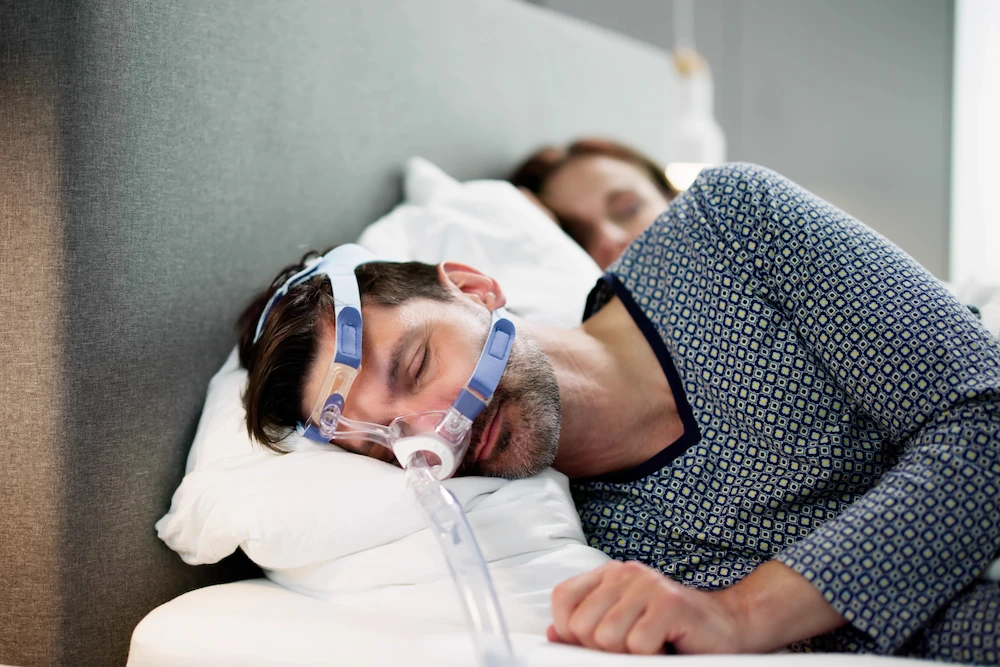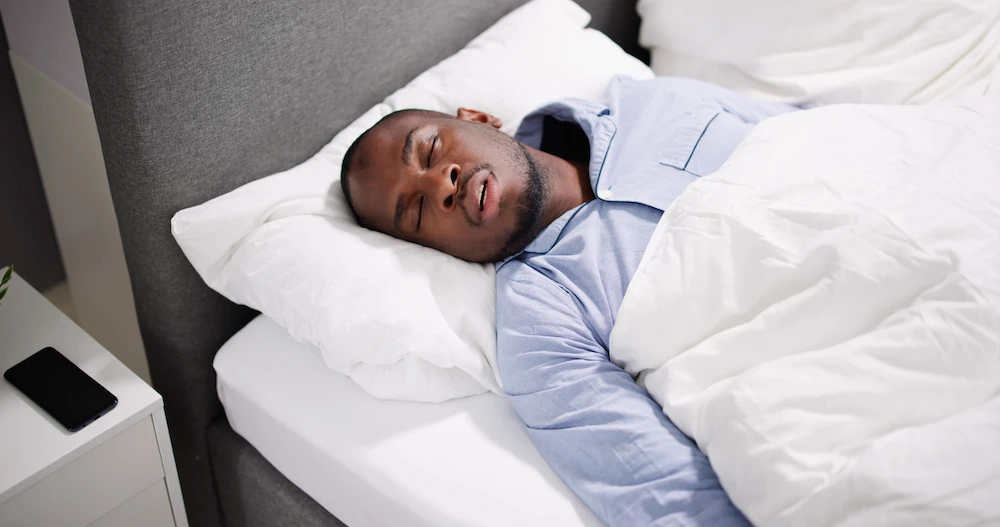Can Sleep Apnea Kill You? Understanding the Risks

Sleep apnea, a common sleep disorder characterized by pauses in breathing during sleep, can significantly impact your quality of life and overall health. But beyond daytime sleepiness and snoring, a more serious question arises: Can sleep apnea kill you?
This article delves into the potential risks of untreated sleep apnea, explores its connection to various health complications, and emphasizes the importance of seeking timely medical attention in Miami.
Understanding Sleep Apnea
Sleep apnea occurs when your airway becomes partially or completely blocked during sleep, leading to pauses in breathing. These pauses can last for a few seconds to several minutes and can occur multiple times throughout the night.
Types of Sleep Apnea:
- Obstructive Sleep Apnea (OSA): The most common type, caused by the relaxation of throat muscles that block the airway.
- Central Sleep Apnea: Less common, occurs when the brain fails to send proper signals to the muscles that control breathing.
- Complex Sleep Apnea: A combination of obstructive and central sleep apnea.
Common Symptoms of Sleep Apnea:
- Loud snoring
- Gasping or choking during sleep
- Pauses in breathing
- Daytime sleepiness
- Morning headaches
- Difficulty concentrating
- Irritability
Tongue Signs for Sleep Apnea: A Potential Indicator
Certain tongue characteristics might suggest sleep apnea:
- Scalloped tongue: Indentations or scalloping along the sides of the tongue.
- Teeth marks on the tongue: Imprints of teeth on the sides of the tongue.
- Enlarged tongue: The tongue might appear larger than normal.

Can Sleep Apnea Kill You? The Risks of Untreated Sleep Apnea
While sleep apnea itself might not directly cause death, it can significantly increase your risk of developing serious health conditions that can be life-threatening, including:
- Cardiovascular Disease: Sleep apnea can strain your heart and contribute to high blood pressure, heart attacks, and strokes.
- Stroke: The repeated drops in oxygen levels during apnea episodes can damage blood vessels and increase the risk of stroke.
- Diabetes: Sleep apnea can worsen insulin resistance and increase the risk of developing type 2 diabetes.
- Obesity: Sleep apnea and obesity often go hand-in-hand, and obesity further increases the risk of cardiovascular disease and other health problems.
- Depression and Anxiety: Sleep deprivation and fatigue associated with sleep apnea can contribute to mental health issues.
Can Sleep Apnea Cause High Blood Pressure?
Yes, sleep apnea can contribute to high blood pressure. The repeated drops in oxygen levels during apnea episodes trigger the release of stress hormones, which can raise blood pressure.
Untreated Sleep Apnea Life Expectancy
Untreated sleep apnea can shorten your life expectancy and significantly impact your quality of life. Seeking timely medical attention and adhering to treatment can help manage the condition and reduce the risk of complications.
Primary Care Doctor and Sleep Apnea: Seeking Help in Miami
If you suspect you have sleep apnea or are experiencing symptoms like loud snoring, daytime sleepiness, or morning headaches, it’s important to consult with a primary care doctor in Miami. They can:
- Assess your symptoms and medical history.
- Recommend a sleep study to diagnose sleep apnea.
- Provide guidance on treatment options, which might include lifestyle changes, CPAP therapy, or oral appliances.
Key Takeaways:
- Sleep apnea can indirectly lead to life-threatening complications like heart disease, stroke, and diabetes.
- Untreated sleep apnea can shorten your life expectancy and significantly impact your quality of life.
- If you suspect you have sleep apnea, consult a primary care doctor in Miami for diagnosis and treatment.
Remember, this article is intended for informational purposes only and should not be considered a substitute for professional medical advice. If you have any concerns about your health or are experiencing symptoms of sleep apnea, consult a qualified healthcare professional.
FAQs: Can Sleep Apnea Kill You?
- What are the most common signs of sleep apnea?
Loud snoring, gasping or choking during sleep, pauses in breathing, excessive daytime sleepiness, morning headaches, and difficulty concentrating are common signs of sleep apnea. If you experience these symptoms, consult a doctor in Miami. - How is sleep apnea diagnosed?
Sleep apnea is typically diagnosed through a sleep study, which can be done at a sleep center or at home with a portable monitoring device. The sleep study measures your breathing patterns, oxygen levels, and brain activity during sleep to identify any disruptions. - Can sleep apnea be cured?
While there’s no guaranteed cure for sleep apnea, various treatment options can effectively manage the condition and reduce its impact on your health. These include lifestyle changes (weight loss, avoiding alcohol before bed), continuous positive airway pressure (CPAP) therapy, oral appliances, and in some cases, surgery. - What are the long-term health risks of untreated sleep apnea?
Untreated sleep apnea can significantly increase your risk of developing serious health conditions like high blood pressure, heart disease, stroke, type 2 diabetes, and depression. It can also worsen existing health problems. - I’m concerned about my snoring and fatigue. How can I find a sleep specialist in Miami?
Your primary care doctor in Miami can provide a referral to a sleep specialist. You can also search online for “sleep specialist near me in Miami” or “sleep center Miami” to find qualified healthcare professionals in your area.
Contact Us
Hiriart & Lopez MD, LLC
9950 SW 107th Ave STE 101,
Miami, FL 33176
305-274-8779
Phone: (305) 274-8779
Fax: (305) 274-0646
OPENING HOURS
Monday 7:30 AM–4:30 PM
Tuesday 7:30 AM–4:30 PM
Wednesday 7:30 AM–4:30 PM
Thursday 7:30 AM–4:30 PM
Friday 7:30–11 AM
Saturday Closed
Sunday Closed
OFFICE LOCATION
Can Sleep Apnea Kill You? Understanding the Risks

Sleep apnea, a common sleep disorder characterized by pauses in breathing during sleep, can significantly impact your quality of life and overall health. But beyond daytime sleepiness and snoring, a more serious question arises: Can sleep apnea kill you?
This article delves into the potential risks of untreated sleep apnea, explores its connection to various health complications, and emphasizes the importance of seeking timely medical attention in Miami.
Understanding Sleep Apnea
Sleep apnea occurs when your airway becomes partially or completely blocked during sleep, leading to pauses in breathing. These pauses can last for a few seconds to several minutes and can occur multiple times throughout the night.
Types of Sleep Apnea:
- Obstructive Sleep Apnea (OSA): The most common type, caused by the relaxation of throat muscles that block the airway.
- Central Sleep Apnea: Less common, occurs when the brain fails to send proper signals to the muscles that control breathing.
- Complex Sleep Apnea: A combination of obstructive and central sleep apnea.
Common Symptoms of Sleep Apnea:
- Loud snoring
- Gasping or choking during sleep
- Pauses in breathing
- Daytime sleepiness
- Morning headaches
- Difficulty concentrating
- Irritability
Tongue Signs for Sleep Apnea: A Potential Indicator
Certain tongue characteristics might suggest sleep apnea:
- Scalloped tongue: Indentations or scalloping along the sides of the tongue.
- Teeth marks on the tongue: Imprints of teeth on the sides of the tongue.
- Enlarged tongue: The tongue might appear larger than normal.

Can Sleep Apnea Kill You? The Risks of Untreated Sleep Apnea
While sleep apnea itself might not directly cause death, it can significantly increase your risk of developing serious health conditions that can be life-threatening, including:
- Cardiovascular Disease: Sleep apnea can strain your heart and contribute to high blood pressure, heart attacks, and strokes.
- Stroke: The repeated drops in oxygen levels during apnea episodes can damage blood vessels and increase the risk of stroke.
- Diabetes: Sleep apnea can worsen insulin resistance and increase the risk of developing type 2 diabetes.
- Obesity: Sleep apnea and obesity often go hand-in-hand, and obesity further increases the risk of cardiovascular disease and other health problems.
- Depression and Anxiety: Sleep deprivation and fatigue associated with sleep apnea can contribute to mental health issues.
Can Sleep Apnea Cause High Blood Pressure?
Yes, sleep apnea can contribute to high blood pressure. The repeated drops in oxygen levels during apnea episodes trigger the release of stress hormones, which can raise blood pressure.
Untreated Sleep Apnea Life Expectancy
Untreated sleep apnea can shorten your life expectancy and significantly impact your quality of life. Seeking timely medical attention and adhering to treatment can help manage the condition and reduce the risk of complications.
Primary Care Doctor and Sleep Apnea: Seeking Help in Miami
If you suspect you have sleep apnea or are experiencing symptoms like loud snoring, daytime sleepiness, or morning headaches, it’s important to consult with a primary care doctor in Miami. They can:
- Assess your symptoms and medical history.
- Recommend a sleep study to diagnose sleep apnea.
- Provide guidance on treatment options, which might include lifestyle changes, CPAP therapy, or oral appliances.
Key Takeaways:
- Sleep apnea can indirectly lead to life-threatening complications like heart disease, stroke, and diabetes.
- Untreated sleep apnea can shorten your life expectancy and significantly impact your quality of life.
- If you suspect you have sleep apnea, consult a primary care doctor in Miami for diagnosis and treatment.
Remember, this article is intended for informational purposes only and should not be considered a substitute for professional medical advice. If you have any concerns about your health or are experiencing symptoms of sleep apnea, consult a qualified healthcare professional.
FAQs: Can Sleep Apnea Kill You?
- What are the most common signs of sleep apnea?
Loud snoring, gasping or choking during sleep, pauses in breathing, excessive daytime sleepiness, morning headaches, and difficulty concentrating are common signs of sleep apnea. If you experience these symptoms, consult a doctor in Miami. - How is sleep apnea diagnosed?
Sleep apnea is typically diagnosed through a sleep study, which can be done at a sleep center or at home with a portable monitoring device. The sleep study measures your breathing patterns, oxygen levels, and brain activity during sleep to identify any disruptions. - Can sleep apnea be cured?
While there’s no guaranteed cure for sleep apnea, various treatment options can effectively manage the condition and reduce its impact on your health. These include lifestyle changes (weight loss, avoiding alcohol before bed), continuous positive airway pressure (CPAP) therapy, oral appliances, and in some cases, surgery. - What are the long-term health risks of untreated sleep apnea?
Untreated sleep apnea can significantly increase your risk of developing serious health conditions like high blood pressure, heart disease, stroke, type 2 diabetes, and depression. It can also worsen existing health problems. - I’m concerned about my snoring and fatigue. How can I find a sleep specialist in Miami?
Your primary care doctor in Miami can provide a referral to a sleep specialist. You can also search online for “sleep specialist near me in Miami” or “sleep center Miami” to find qualified healthcare professionals in your area.
Contact Us
Hiriart & Lopez MD, LLC
9950 SW 107th Ave STE 101,
Miami, FL 33176
305-274-8779
Phone: (305) 274-8779
Fax: (305) 274-0646
OPENING HOURS
Monday 7:30 AM–4:30 PM
Tuesday 7:30 AM–4:30 PM
Wednesday 7:30 AM–4:30 PM
Thursday 7:30 AM–4:30 PM
Friday 7:30–11 AM
Saturday Closed
Sunday Closed

